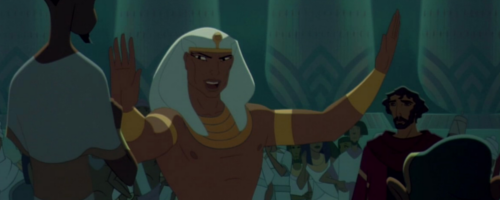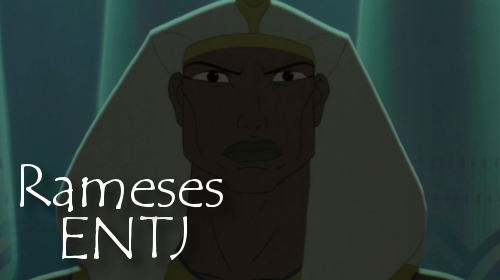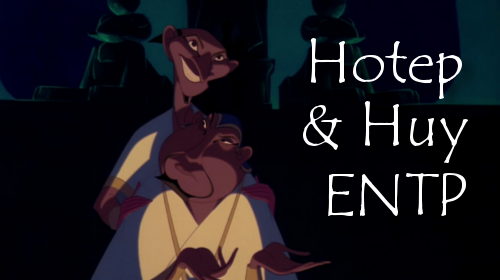 Merry Christmas, everyone! Please enjoy this image of the characters and their types from The Prince of Egypt series. I’ll see you on the other side of the new year with a new series of characters.
Merry Christmas, everyone! Please enjoy this image of the characters and their types from The Prince of Egypt series. I’ll see you on the other side of the new year with a new series of characters.
Tag Archives: Dreamworks
ENTJ: Rameses, “The Prince of Egypt”
ENTJ, The Commander, The Field-Marshall, The Trailblazer
Rameses is a pretty classic ENTJ movie villain, fulfilling all the traits that the movies need out of their ENTJs—ambitious, relentless, intelligent, and lacking remorse. He’s not a terribly good person to write about for a post coming out on Christmas Eve. If it helps, you can go back and read about a more healthy and loveable ENTJ, the Scarecrow from The Wizard of Oz. You can also re-read the first entries of this Prince of Egypt series, beginning with Moses—who happens to be Rameses’ mirror, reversing his letters (ISFP) and flipping the order of his cognitive functions.
No wonder these two clashed.
Dominant Function: Te/Extraverted Thinking, “Organize the Experience”
 Rameses is in it to win. Even in a boyish, just-for-fun chariot race, he reminds his younger brother of their hierarchy: “Second born! Second best!” He blames Moses for always getting him into trouble and making him look bad.
Rameses is in it to win. Even in a boyish, just-for-fun chariot race, he reminds his younger brother of their hierarchy: “Second born! Second best!” He blames Moses for always getting him into trouble and making him look bad.
He bristles at his father’s criticism that he’s foolish and irresponsible. Given new responsibility, Rameses takes charge of constructing a new temple and builds it bigger and better. He finds great pleasure in his accomplishments.
When Moses kills a slave master, Rameses offers to make it so that it never happened. “I am the morning and the evening star!” he recites. “If I say it, it will be done!”
Many years later, when Moses returns, Rameses has built up the kingdom of Egypt to great heights. His father’s criticism stings him even later in life, though, welling up when Rameses shouts that he will not be the weak link. He fears failure.
He’s not about to bend his will to Moses’ newfound God, either. Like his father before him, he sees the Hebrew slaves as nothing more than a means to an end. He increases their workload in response to Moses’ plea for freedom, and looks to the priests to disprove his brother’s “tricks.” It takes the battering of the Ten Plagues for him to change his mind, and even then, it’s more of an emotional decision.
Once the Hebrews have left, Rameses pulls it back together and leads his army against them.
It does not go as planned. Continue reading
ENFJ: Jethro, “The Prince of Egypt”
ENFJ, The Giver, The Mentor, The Believer
Jethro and the Queen make nice back-to-back mini-profile entries. As an ENFJ and INFJ respectively, they mirror each other, sharing the same first two functions, but flipped. This makes Jethro the more outgoing of the two, led as he is by Extraverted Feeling, but both act as mentor figures to Moses with insight and genuine care.
Dominant Function: Fe/Extraverted Feeling, “Relate to the Experience”

Just as Moses gets out of the bath, Jethro barrels into the tent and hugs him, literally lifting him up with joy. He welcomes Moses into his family despite his past, and showers him with generosity, love, and encouragement. Jethro leads the festivities when we see him and his people celebrating a feast around the bonfire. As High Priest of Midian, he acts as the focal point of his people’s good spirits and sense of community, even as they live as nomads in the desert.
In a scene played out in silhouettes, Jethro seems to resolve a dispute between Moses and Zipporah by deciding that they should be married.
Auxiliary Function: Ni/Introverted Intuition, “Anticipate the Experience”
 Jethro’s song, “Through Heaven’s Eyes,” introduces Moses to new, higher perspective. Whereas Moses sees only pain and confusion in his life, Jethro sees a tapestry weaving together a greater pattern. He uses several bits of symbolism and metaphor to help Moses understand his life—a small rock cannot see the larger mountain it’s a part of, and so on—and encourages Moses to believe that his life still has a meaning and purpose that will one day reveal itself.
Jethro’s song, “Through Heaven’s Eyes,” introduces Moses to new, higher perspective. Whereas Moses sees only pain and confusion in his life, Jethro sees a tapestry weaving together a greater pattern. He uses several bits of symbolism and metaphor to help Moses understand his life—a small rock cannot see the larger mountain it’s a part of, and so on—and encourages Moses to believe that his life still has a meaning and purpose that will one day reveal itself.
INFJ: Queen Tuya, “The Prince of Egypt”
INFJ, The Counselor, The Defender, The Seer
Traditionally, the wife of Seti is known as Queen Tuya, so even though she’s never addressed by that name in The Prince of Egypt, that’s what I’m gonna go with here.
Dominant Function: Ni/Introverted Intuition, “Anticipate the Experience”
 In the commentary for the movie, the filmmakers explain that the opening sequence with Moses in the river is meant to be read in an open-ended way. One can conclude that is was pure chance that he survived, or that more divine forces were at work (of course, later God actually appears, and staffs turn to snakes, and fire comes out of the sky, so).
In the commentary for the movie, the filmmakers explain that the opening sequence with Moses in the river is meant to be read in an open-ended way. One can conclude that is was pure chance that he survived, or that more divine forces were at work (of course, later God actually appears, and staffs turn to snakes, and fire comes out of the sky, so).
Tuya reads purpose and meaning into Moses’ arrival, and concludes that he is a gift sent to her by the gods. She immediately claims him as her son and names him Moses. She’s discerning the connections of a past event rather than a future one, but her Ni is still arriving at a conclusion that others might miss.
Even later, when Moses learns his true heritage, the Queen stands by her belief. The facts of the matter may be that Moses was born of a slave woman and shares no blood with Tuya, but her Intuitive truth is that he is her son. “It’s here the river brought you, and it’s here the river meant to be your home,” she sings to him.
Auxiliary Function: Fe/Extraverted Feeling, “Relate to the Experience”
 Tuya acts as a diplomat in her own family, keeping her husband and sons emotionally honest and balanced. A gentle touch on the shoulder while he’s reprimanding their boys is enough to change the King’s tone, and a disappointed glance serves to jog Moses’ conscience when he humiliates Zipporah at the feast. She also seems to imply that she encouraged Seti’s decision to give Rameses a second chance. Thus, her Fe serves her Ni by prodding people along based on the potential she sees in them.
Tuya acts as a diplomat in her own family, keeping her husband and sons emotionally honest and balanced. A gentle touch on the shoulder while he’s reprimanding their boys is enough to change the King’s tone, and a disappointed glance serves to jog Moses’ conscience when he humiliates Zipporah at the feast. She also seems to imply that she encouraged Seti’s decision to give Rameses a second chance. Thus, her Fe serves her Ni by prodding people along based on the potential she sees in them.
Tuya doesn’t hesitate to take in the baby who randomly washes up in front of her, even though she certainly knows he’s a Hebrew who’s supposed to be killed. It had to have been a calculated risk (possibly weighed and analyzed by her tertiary Ti) to rescue the child in direct opposition to her husband’s edict (and in the Biblical account, his biological mother is even allowed to act as wet nurse, so he must have been one cute baby).
When Moses’ whole world starts to collapse when he learns the truth, the Queen comforts him and assures him she will always love him as her son. For the wife of a man responsible for genocide, Queen Tuya is a constantly selfless and giving woman.
ENTP: Hotep & Huy, “The Prince of Egypt”
ENTP, The Inventor, The Trickster, The Debater
I once interviewed two comedy writers for a podcast, and one of them was a self-reported ENTP. The other was usually more reserved—maybe an INTP?—but when she got together with her bestie, the two women never stopped talking, joking, and brainstorming, jumping from one funny concept to the next as they inspired each other. I said very little during the interview, and our original topic was lost within the first 30 seconds or so. It was extremely difficult to find twenty minutes or so of a coherent conversation to edit into the final podcast, but the recording session itself was tons of fun. I kind of think of those two as a real-life Hotep and Huy.
Dominant Function: Ne/Extraverted Intuition, “Conceptualize from the Experience”
 Hotep and Huy are never at a loss for ideas. They quickly invent a way to mimic the water turning to blood, and they turn their staffs into snakes to fight Moses’ serpent. They’re constantly adaptable and flexible in the moment, and they have a million tricks up their sleeves to impress their audience. If you pay attention in their song “Playing With the Big Boys,” they’re literally using smoke and mirrors to create their magic.
Hotep and Huy are never at a loss for ideas. They quickly invent a way to mimic the water turning to blood, and they turn their staffs into snakes to fight Moses’ serpent. They’re constantly adaptable and flexible in the moment, and they have a million tricks up their sleeves to impress their audience. If you pay attention in their song “Playing With the Big Boys,” they’re literally using smoke and mirrors to create their magic.
Auxiliary Function: Ti/Introverted Thinking, “Analyze the Experience”
 For the ENTP, the analytical power of Ti supports the creativity of their Ne, resulting in the archetype name of “The Inventor.” We see Hotep and Huy studying and working hard to counteract the effects of the Ten Plagues. They manage to turn water into “blood,” but after that they’re left stymied.
For the ENTP, the analytical power of Ti supports the creativity of their Ne, resulting in the archetype name of “The Inventor.” We see Hotep and Huy studying and working hard to counteract the effects of the Ten Plagues. They manage to turn water into “blood,” but after that they’re left stymied.
Tertiary Function: Fe/Extraverted Thinking, “Relate to the Experience”
 Hotep and Huy know how to work an audience. Despite the fact that most of what they do is a trick, they never fail to awe and wow. They also see Moses as a threat to their position, and use their power to emotionally manipulate him into cowing before them.
Hotep and Huy know how to work an audience. Despite the fact that most of what they do is a trick, they never fail to awe and wow. They also see Moses as a threat to their position, and use their power to emotionally manipulate him into cowing before them.
Inferior Function: Si/Introverted Sensing, “Relive the Experience”
 I’m not entirely sure how Introverted Sensing acts in the inferior position for an ENTP, except that typically it’s supposed to mean they’re focused more on the future and novelty than on past experience (witness Captain Mal from Firefly, who has a specific scene where he talks about the fact that he never talks about his past). Hotep and Huy have a position in a long-established kingdom to maintain, and they’re also quick to point out the standard of law that requires the death penalty for Moses.
I’m not entirely sure how Introverted Sensing acts in the inferior position for an ENTP, except that typically it’s supposed to mean they’re focused more on the future and novelty than on past experience (witness Captain Mal from Firefly, who has a specific scene where he talks about the fact that he never talks about his past). Hotep and Huy have a position in a long-established kingdom to maintain, and they’re also quick to point out the standard of law that requires the death penalty for Moses.
So, once again, I’ve ended up covering all four functions for a mini-profile, but Hotep and Huy are worth it, I think. The Queen and Jethro are up for mini-profiles next, and then we’ll finish the series out with Pharoah himself, Rameses.
ISFJ: Aaron, “The Prince of Egypt”
ISFJ, The Protector, The Cultivator, The Steward
Let’s talk about stereotypes. One of the major complaints against MBTI is that it’s just a bunch of stereotypes that define people by four measly letters. And that’s kinda true, to an extent.
Any number of “What would each type do in X situation?” posts out there typically rely on the stereotypical behaviors of each type to fulfill their meme. People click the “like” button and respond, “That’s so me!” and the stereotype is carried on.
However, a healthy, well-developed person of any type can look like anything they choose. The stereotypes exist because it’s easy to make predictions based on simple, exaggerated examples of the functions. Someone who has balanced access to all their functions will defy those exaggerations and stereotypes. An ENTJ with feeling? Yes! An organized ISFP? Absolutely! You can be anything you want to be, and your MBTI type is just a tool to help you get there.
If you match the stereotype, you’ve got some work to do.
Poor Aaron matches the stereotype of the ISFJ. He’s fearful of the future, appeasing to his oppressors, and set in his familiar ways, even though those ways mean a life of slavery. As the story of The Prince of Egypt unfolds, however, Aaron finds his faith—in his brother, his God, and in the future—and grows into a warm, supportive, and courageous Protector.
Dominant Function: (Si) Introverted Sensing, “Relive the Experience”
 Introverted Sensing seeks to compare its present circumstances to those it’s known before. Unfortunately, all Aaron’s ever known is his life as a slave. When Moses comes along promising deliverance, he doesn’t quite know what to do with that.
Introverted Sensing seeks to compare its present circumstances to those it’s known before. Unfortunately, all Aaron’s ever known is his life as a slave. When Moses comes along promising deliverance, he doesn’t quite know what to do with that.
Aaron tries to keep the boat from rocking. Slavery may not be the best life, but it’s all the Hebrews have got. Both times that Miriam makes a scene—when she excitedly introduces herself to Moses, and when she speaks out against an old man getting whipped—Aaron holds her back. He feels a deep need to preserve things the way they are, to keep them safe and normal. Circumstances might not get better, but at least they won’t get worse.
Except that they do. Rameses increases the Hebrews’ workload in response to Moses’ demand for freedom, and Aaron gets angry. He scolds Moses for his actions, recounting all the times that God has not shown up for them all these years. He wants Moses to understand what their life is like, and shows great envy and bitterness at the good life Moses had growing up. Continue reading
ESFP: Zipporah, “The Prince of Egypt”
ESFP, The Performer, The Activator, The Challenger
I made a big stink when I started this series about the characters in The Prince of Egypt actually being portrayed as brown. That applies to the way they appear on screen, but not necessarily for the actors who give them their voices. Of all the actors playing major characters in The Prince of Egypt, I can only think of two who actually have Jewish heritage–Jeff Goldblum as Aaron, and singer Ofra Haza as Moses’ biological mother Yocheved. What do you think? Does it matter in a medium like animation who the voice actors are, or is it enough that the characters are drawn as ethnically-appropriate?
Today’s character, Moses’ wife Zipporah, was voiced by Michelle Pfieffer, who’s just about as white as can be. I wouldn’t have thought of her for the role of as tough a character as Zipporah, but then at the time the movie was released, I still hadn’t seen Batman Returns. Or Dangerous Minds. I’ve fixed only one of those in the years since.
But enough about the actress! Let’s meet the character!
Dominant Function: Se/Extraverted Sensing, “Experience the Experience”
Zipporah springs into action in response to every situation she encounters. She shows no doubts or second thoughts about her actions, and completely trusts her impulses. We first meet her fighting back against her captors when she’s presented as a gift to the Princes of Egypt. Not long after, she’s tied up her guards and run off into the night.
It’s a long time before we see her again, and when we do, she leaps into action to help Moses out of the well he’s fallen into. The moment she realizes it’s him, she drops him right back into the well.
Eventually, once she sees Moses showing a true change in character, she takes the initiative to get him to dance with her. In the commentary for The Prince of Egypt, the filmmakers reveal that the traditions of the time would have made it inappropriate for an unmarried man and woman to touch each other. Zipporah gets around this by wrapping a scarf around Moses and pulling him into the dancing circle with her.
I believe the term is, “You go, girl!”?
Zipporah feels a strong connection to her environment and the world she knows with her senses. When Moses tells her of his encounter with God, she’s hesitant at first to share his excitement—an encounter with a deity who spoke out of a burning bush seems too far outside her experience. Once she understands how important Moses’ task is to him, though, she immediately decides to go with him.
In the end, after the Hebrews have crossed the Red Sea, and Moses is brooding over the loss of his brother, Zipporah prods her husband out of his reverie to show him how happy everyone is: “Look at your people, Moses. They are free!” Continue reading
The Prince of Egypt MBTI
Alien is in my top ten, if not top five, favorite movies of all time. Let me just get that out of the way at the start. Ridley Scott has made some mesmerizing stuff in his time.
However, last week he released Exodus: Gods and Kings, the latest in a long line of languid “epics” that I haven’t been tempted in the slightest to see (okay, I saw Prometheus with big hopes and excitement, but I’m pretty sure I was emotionally and visually scarred by the experience).
It isn’t just the movie’s bad reviews or Scott’s recent bad track record that turns me off, though. It’s the casting of white European actors in what should have been roles for Middle Eastern, African, and otherwise brown actors that feels tasteless to me. And to twist the knife further, Scott made a blatantly racist statement about his reasons for casting the stars he did instead of ethnically appropriate talent.
To cleanse my palette of the affair, I re-watched The Prince of Egypt. I deeply loved this movie when I first saw it, and I’ve watched it many times. I hadn’t seen it lately, though. One evening this weekend I turned it on as background, and soon I’d forgotten what I was doing and sat transfixed for the whole experience.
This movie’s good, is what I’m saying. Somehow, the folks at Dreamworks* managed to make the story of the Exodus a musical, and came up with emotionally authentic songs that are also catchy. They danced a tricky theological line by writing an adaptation that dramatizes the story while retaining the spiritual truth of it. And they drew characters who are brown!
I’m of white European descent myself (half Serbian, half German), although I get mistaken for Jewish a lot thanks to my coloring. When The Prince of Egypt came out, I missed it at first, but all my friends came rushing up to me at church that weekend to tell me how great it was and that Moses was totally me. I hadn’t grown a beard yet (although I believe that year I was experimenting with an unimpressive goatee), but the comparison was enough than I made an instant connection with Moses when I finally saw the movie. I related to his spiritual journey, in his search for authenticity and truth, and his dependence on God to get him to the impossible place he was going.
To help drive more people to watch or re-watch this movie instead of Exodus, I decided to write MBTI profiles of the main characters of The Prince of Egypt. Mind you, I’m not saying these are fictional characters, just fictional representations of the people whose lives are recorded in the book of Exodus. Even if you consider them fictional though, I think you’ll appreciate these profiles. Like I said, it’s a great movie, and you should see it. Repeatedly.
*If you ever call The Prince of Egypt a Disney movie, I’ll throw a stone tablet at you.







